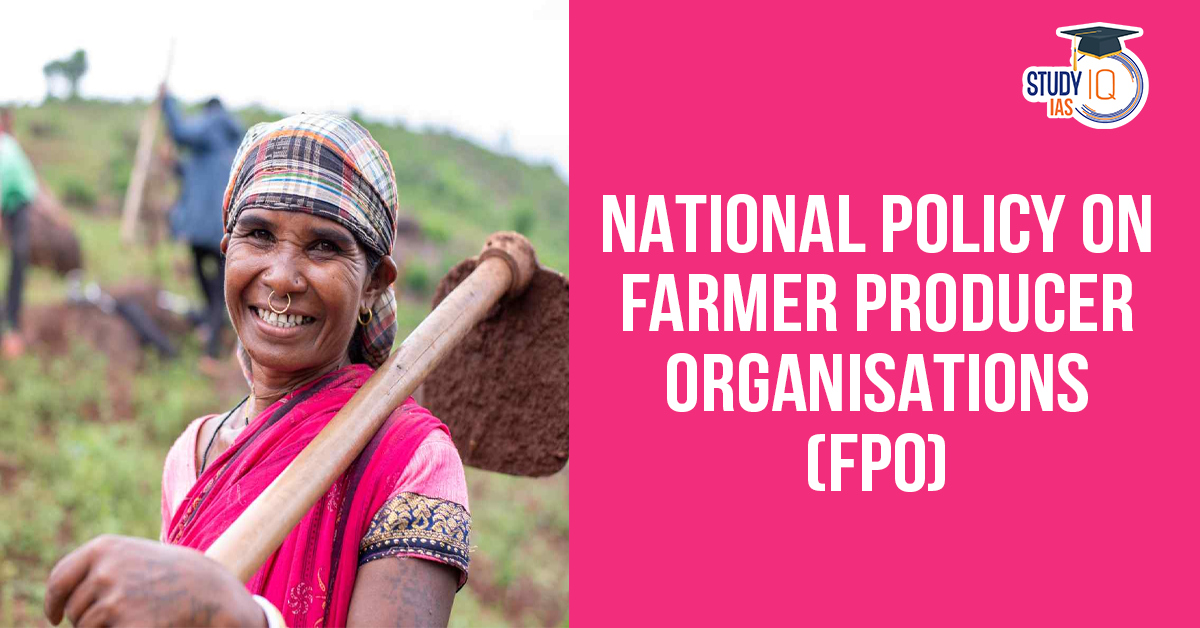Table of Contents
The Department of Agriculture & Farmers’ Welfare (DAFW) has released a draft National Policy for Farmer Producer Organizations (FPOs) to create a supportive ecosystem for their growth and efficiency.
What is a Farmer Producer Organization (FPO)?
- Farmer Producer: Refers to individuals engaged in agriculture, fisheries, animal husbandry, and related activities, regardless of land ownership.
- FPO Definition: A collective of farmer-producers, owned, managed, and governed by them, registered as legal entities under laws like the Companies Act, 2013 or the Cooperative Societies Act.
Historical Context
The Y.K. Alagh Committee suggested amendments to the Companies Act of 1956 to facilitate the formation of Farmer Producer Companies (FPCs), merging cooperative principles with business-friendly regulations.
Features and Characteristics
- Scope: Covers pre-production, production, and post-production activities in agriculture and allied fields.
- Support: Promoted by entities like the Small Farmers’ Agribusiness Consortium (SFAC).
- Functions: Enables collective marketing, trading, and distribution, eliminating middlemen and benefiting small/marginal farmers.
Benefits of FPOs
- Over 7,000 functional FPOs currently exist, with a target of forming 10,000 new FPOs under a central scheme.
- Boosts productivity and profits for member farmers through shared resources and collective action.
Draft National Policy on FPOs
Need for the Policy:
To build a facilitative ecosystem, consolidate existing FPOs, and form new ones, transforming them into vibrant enterprises.
Vision:
To develop a sustainable ecosystem that enhances productivity and profitability for farmer-producers through collective action and collaboration with stakeholders.
Mission:
To establish 7-8 active FPOs per block, targeting approximately 50,000 FPOs in the next five years.
Guiding Values:
- Voluntary mobilization of farmer members.
- Inclusive participation without socio-economic discrimination.
Significance
The policy aims to benefit 2.5 crore farmers, representing 17% of operational holdings (as per the 2015-16 agriculture census).
Key Highlights of Draft Policy
- State-Level Policies:
- States are encouraged to develop their own FPO policies aligned with the national framework.
- Inter-Ministerial Collaboration:
- Simplification of FPO incorporation processes.
- Engagement between agriculture and finance ministries to facilitate easier institutional loans.
- Access to Cheaper Loans:
- Special provisions for FPOs within primary sector lending norms.
- Three-Tier Model:
- Advocacy for an Amul-like three-tier structure for FPOs to enhance operational efficiency.
- FPO Mandis and Platforms:
- Empowering FPOs to issue trading licenses and integrate with platforms like eNAM and ONDC.
- Procurement and Stock Limits:
- Enabling FPOs to procure produce at Minimum Support Price (MSP) and exemption from stock limit restrictions.
- Talent Retention:
- Developing schemes to attract and retain qualified CEOs and managers for FPOs.
- Farm Productivity:
- Studies reveal FPO member farmers experience 18.75% to 31.75% increases in productivity.
Targets and Evaluation:
- 50,000 FPOs to be formed in the next few years.
- Comprehensive assessment of all schemes, including the 10,000 FPOs scheme, to ensure effectiveness.
Draft National Policy on FPOs PDF
The draft National Policy on FPOs seeks to revolutionize the agricultural landscape in India by creating a robust ecosystem for farmer collectives. It focuses on productivity, profitability, and sustainability, aiming to empower millions of farmers and promote rural development.


 Places in News for UPSC 2025 for Prelims...
Places in News for UPSC 2025 for Prelims...
 Countercyclical Capital Buffer (CCyB): P...
Countercyclical Capital Buffer (CCyB): P...
 STELLAR Model: A Game-Changer in Power S...
STELLAR Model: A Game-Changer in Power S...





















